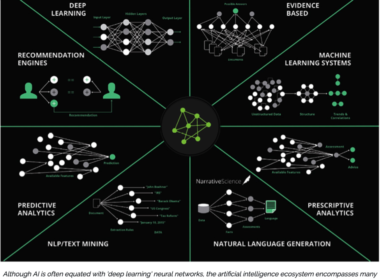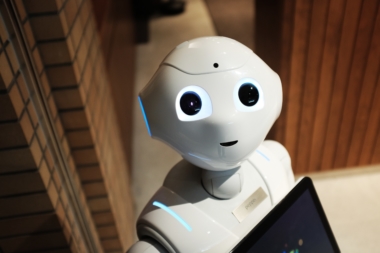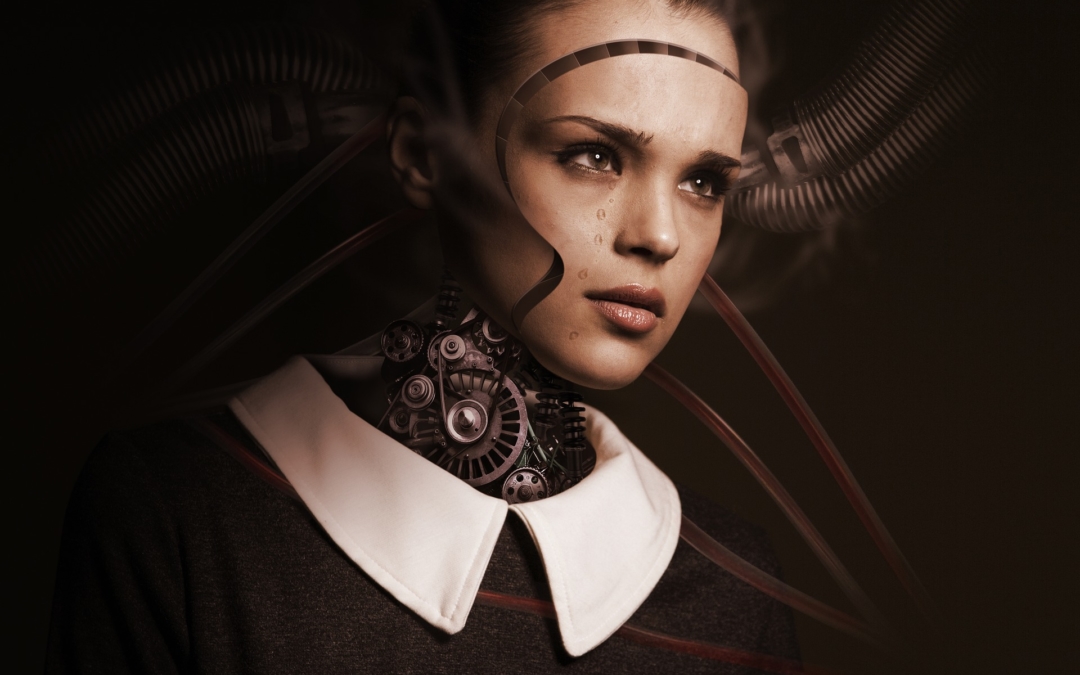The modern world has been shaped by the technological revolutions of the past, like the Industrial Revolution and the Information Revolution. The former redefined the way the world values both human and material resources; the latter redefined values in terms of resources while democratizing information.[1] Today, as technology progresses it is said we are entering a further phase of the information revolution: the digital revolution, which is characterized by a fusion of technologies that is blurring the lines between the physical, digital, and biological spheres.[2] Artificial Intelligence, or AI for short, defines technologies emerging today that can understand, learn, and then act based on that information, encompassing not only computer science but also psychology, philosophy, linguistics, to name a few. AI is being applied to healthcare, business, educaton, finance and manufacturing and many of the largest software tech companies of today like Amazon, Apple,Google, and Facebook owe their success to applications of these various algorithmic processes within their programs. AI now plays a role in our day-to-day activities, and the more it is integrated, it becomes less conspicuous. We are only starting to grasp the implications of AI’s ubiquitous integration now, and it is imperative that we understand what the social, physiological and emotional impacts these collective technologies may have on our ultimate behaviour, our bodies and our society at large before we go beyond a point of no return.
[1] https://www.pwc.in/assets/pdfs/consulting/digital-enablement-advisory1/pwc-botme-booklet.pdf
[2] https://www.weforum.org/agenda/2016/01/the-fourth-industrial-revolution-what-it-means-and-how-to-respond/
What is Artificial Intelligence?
Artificial Intelligence (AI) has been the recent focus of sci-fi books, cinema, the world of Information Technology, and businesses, not to mention the media. AI, as it began at Dartmouth in 1956 was based on the “conjecture that every aspect of learning or any other feature of intelligence can in principle be so precisely described that a machine can be made to simulate it.”[1] What we are hearing about today is commonly referred to as “narrow” AI, and it covers a broad range of topics that include knowledge representation, machine learning, natural language processing, computer vision, reasoning and logic, robotics, information systems, motion planning, speech technology, speech recognition, and image processing. In a strict sense, there is nothing even close to emulating human intelligence and therefore, no one has created a true AI. To offer clarity, human intelligence level AI is now often referred to as artificial general intelligence (AGI) or “strong AI” and is said to be many years off. [2] Superintelligence, defined as “any intellect that greatly exceeds the cognitive performance of humans in virtually all domains of interest” is expected some 30 years after the achievement of AGI. [3] In short, AI is the science of mimicking human intelligence inside a computer, but we have gotten ahead of ourselves in terms of the current capacities of AI being able to do so. Despite that, the long term goal of AI is worthy of our attention as we are clearly seeing the impact of the digitization of all things human.
[1] https://www.nap.edu/read/6323/chapter/11
[2] http://www.zdnet.com/article/inside-the-black-box-understanding-ai-decision-making/
[3] http://www.zdnet.com/article/inside-the-black-box-understanding-ai-decision-making/
Deeper Dive into “Narrow” AI :
 Narrow Artificial Intelligence encompasses many types of algorithms, and has advanced in fields such as computer games, neural networks, natural language processing, expert systems and robotics to name a few. Its main task is to take the massive amounts of data that has been generated in various forms (for example, text, audio, and images) and make it intelligible by using intelligent systems to transform the data into something useful. The three core functions of narrow AI are to access (machine learning, deep learning, reasoning from evidence, natural language processing), predict (predictive analysis, recommendation engines) and advise (based on goals-rules become the driver to give advice)[1].
Narrow Artificial Intelligence encompasses many types of algorithms, and has advanced in fields such as computer games, neural networks, natural language processing, expert systems and robotics to name a few. Its main task is to take the massive amounts of data that has been generated in various forms (for example, text, audio, and images) and make it intelligible by using intelligent systems to transform the data into something useful. The three core functions of narrow AI are to access (machine learning, deep learning, reasoning from evidence, natural language processing), predict (predictive analysis, recommendation engines) and advise (based on goals-rules become the driver to give advice)[1].
From these core functions of assess, process and advise, three main groups or applications in narrow AI have emerged:
1)Assisted intelligence: improves what people and organizations are already doing. A GPS navigation program in a car that offers directions to drivers and adjusts to road conditions is one example. A digital assistant that finds information, answers questions, makes recommendations is another example.
2)Augmented intelligence: enables people and organizations to do things they couldn’t otherwise do. For example, the combination of programs that organize cars in ride-sharing services enables businesses that could not otherwise exist.
3) Autonomous intelligence, being developed now, establishes machines that act on their own. An example of this is autonomous, or self-driving vehicles.[3]
Without a question, we would not have been able to map the human genome, land airplanes in the way we do now, have personal devices complete with digital assistants, or synthesize a wide range of symptoms into a health diagnosis without the aid of narrow, or simple artificial intelligence. As we advance, algorithms such as deep neural networks like neuroevolution which use evolutionary principles within a computer program to try to trigger an evolutionary process similar to the one that produced our brains, we can see that perhaps we are moving quickly towards a “technology singularity”.[4] The idea that ordinary humans will someday be overtaken by artificially intelligent machines or cognitively enhanced biological intelligence, or both—has moved from the realm of science fiction to serious debate.
The video below describing the Japanese robot named Erica demonstrates the line of thinking necessary to create a machine that is now being used to announce the news in Japan. Created by Hiroshi Ishiguro in an attempt to understand humans, we are seeing where the lines are becoming blurred between humans and robots as we attempt to replicate nature.
Other robots are receiving much publicity, like Sophia, the first robot to be granted citizenship (previously reserved for living, biological systems) by the Kingdom of Saudi Arabia. Shibuya Mirai, a mere chatbox, that has been granted residence status in Tokyo. Further, Sophia is being used in a research project to study how AI agents can communicate unconditional love to humans through robot/human conversations that adapt to the unique needs of each user while supporting integrative personal and relational development.[5] Sophia has also started to “advocate” for women’s rights in a country where females have only been given the right to drive cars in September of 2017. [6]
Beyond robots, we are using voice analytics to implement “artificial empathy”, something call centers are using to predict how a customer may feel. This particular application has also been studied by the U.S. military to see if it can identify signs of PTSD and depression in veterans.[7] Being able to foster communication and connection beyond language could have interesting implications in diplomacy and conflict resolution, and its bound to improve our experience with AI assistants and robots.[8]
As was it was first intended and described 60 plus years ago, artificial (general) intelligence (AGI) or “strong AI” was intended to have the full spectrum of human capabilities, which at the moment, is well beyond our grasp. However, with the ongoing advances in robotics, neural networks and machine learning as discussed above, perhaps humanity would be well served by re-evaluating the implications of AGI and the “super intelligence” predicted to follow this stage of narrow AI, sooner, rather than later.
[1] https://narrativescience.com/Resources/Resource-Library/Article-Detail-Page/on-demand-webinar-introduction-to-artificial-intelligence-ecosystem
[2] http://www.zdnet.com/article/inside-the-black-box-understanding-ai-decision-making/
[3] https://www.pwc.in/assets/pdfs/consulting/digital-enablement-advisory1/pwc-botme-booklet.pdf
[4] https://www.oreilly.com/ideas/neuroevolution-a-different-kind-of-deep-learning
[6] https://futurism.com/saudi-arabia-made-robot-citizen-calling-womens-rights/
[7] https://futurism.com/artificial-intelligence-officially-granted-residency/
[8] Being able to foster communication and connection beyond language could have interesting implications in diplomacy and conflict resolution, and its bound to improve our experience with AI assistants and robots.
Given where are we now what questions might we want to ask from a consciousness perspective?
Ray Kurzweil predicted in his 1999 non-fiction book, “The Age of Spiritual Machines”, machines with human-level intelligence would be available from affordable computing devices within a couple of decades, revolutionizing most aspects of life and predicted that machines “will appear to have their own and even “spiritual experiences”.[1] There is much reason to doubt that we will ever come close to this description, but given the technological advances of late, it causes somewhat of a need for introspection-what does it mean to be human, and how do we define a human being? What is consciousness? Can computation alone create a mind, and is that enough to create inner subjective experiences, as people do? Can awareness be captured mathematically and be truly expressed or incorporated within a system that does not have the capacity to feel? If it an AI system can’t feel, is it conscious? How do we know these algorithms are accurate and based on who’s point of view: after all, it is difficult to be human without being biased. How do we account for our unique human experiences and our different perspectives of such subjective experiences? Can anything truly describe a spiritual awakening, or falling in love with any kind of authority or accuracy? Where does synchronicity or intuition come into the equation of what it is to be human? Can we create algorithms that completely describe hearing a piece of music or reading a poem that has the capacity to move a human being into a state of being that can only be described as mystical? What is the intelligence that creates to capacity to heal itself?
 Our brain reacts to things that have meaning, versus the things we call objects. Since we have entered the scientific age, our experience has been reduced to smaller and smaller particulars,has been objectified, and has become external from us- meaning and purpose seem to be illusory. We can’t account for consciousness now, so how will do this in the future? How do we define reality ? The potential promise of being able to accumulate, collate and make sense of the enormous amount of data that makes up a single moment in a human beings’ experience and covert it into 1’s and 0’s seems outrageously complicated and monumental. Will a machine be able to do abstract reasoning? Transferring nature into technology using AGI seems premature given we still don’t understand how we our brains work.
Our brain reacts to things that have meaning, versus the things we call objects. Since we have entered the scientific age, our experience has been reduced to smaller and smaller particulars,has been objectified, and has become external from us- meaning and purpose seem to be illusory. We can’t account for consciousness now, so how will do this in the future? How do we define reality ? The potential promise of being able to accumulate, collate and make sense of the enormous amount of data that makes up a single moment in a human beings’ experience and covert it into 1’s and 0’s seems outrageously complicated and monumental. Will a machine be able to do abstract reasoning? Transferring nature into technology using AGI seems premature given we still don’t understand how we our brains work.
What are the risks of AI?
As AI has moved from academic research labs to real-world implementation it has caused problems – none of which have easy answers. As we hurtle down the track of technological advances, what of the ethical, moral and humanitarian implications of these aspirations? More importantly, what if the assumptions we used to train the AI system are wrong? We already have issues with not knowing exactly how a neural network arrived at its’ answer since it is somewhat of a black box and is self learning.[2] If you don’t know how it got to the answer, should you trust it?
Machine learning and other advanced artificial intelligence algorithms will become more prevalent in our daily lives, and it is increasingly important to address the inherent biases and ethical blind spots built into these systems. Our digital activities are being tracked as determined by both our implicit and explicit activity by tech giants like Google, Amazon and Facebook, and then are analyzed and fed back to us via algorithms that may suggestion what we might like to read, listen to, or experience in terms of food, entertainment and beyond. How this pervasive is this technology in terms of creating behaviours?
Digital assistants like Amazon’s Alexa/Echo, Apple’s Siri, Google’s Assistant, and Microsoft’s Cortana are capturing data that predict behaviours that go well beyond suggesting the next song on our favorite music app. How this is being done and what the data is being used for brings up questions about how this information is collected, shared or used. One need not go far to see real world examples of this in the media: as of March 19, 2018, Facebook CEO Mark Zuckerberg has been asked to testify about reports that Cambridge Analytica, a political data consulting firm utilized by the Trump campaign, harvested the information of up to 50 million users.[3]
Further ethical implications of the use and integration of artificial intelligence beyond trust, transparency, accountability, privacy and respect is its impact on the work force, a topic that many world and industry leaders are considering heavily today.
[1] https://en.wikipedia.org/wiki/The_Age_of_Spiritual_Machines
[2] https://www.forbes.com/sites/parmyolson/2018/03/13/google-deepmind-ai-machine-learning-bias/ – 129fbea96829
[3] https://www.cbsnews.com/news/democratic-senator-calls-on-mark-zuckerberg-to-testify-before-congress/

Conclusion:
Artificial Intelligence has been one of the most controversial domains in computer science since it was first proposed and represents a confluence of scientists and technologists with varying perspectives, motivations and interests. We are now at an inflection point in the development and application of AI technologies and perhaps it would be wise to consider crucial philosophical and pragmatic questions before we might suffer long term problems that might have been avoided. How is this highly complex task of emulating human intelligence being accomplished, what are the risks and how will its eminent arrival impact society as a whole? The upswing in AI competencies, fueled by data, computation, and advances in algorithms promise great value to people and society. However, with successes come new concerns and challenges based on the effects of those technologies on people’s lives. These concerns include the safety and trustworthiness of AI technologies, the fairness and transparency of systems, and the intentional as well as inadvertent influences of AI on people and society.[1] We risk unleashing systems that may have far-reaching and disastrous consequences across many areas of society, from self-driving cars, to the use of robots in human interactions, to medical diagnoses and judicial decisions. As this technology reach grows and is engrained into consumer products and services, elements of control and regulation are being demanded by more and more thought leaders around the world and lawmakers are just starting to wrestle with some truly fantastic questions. It is of the utmost importance to address these issues head-on so we can properly be prepared for the future, as many ideas that were previously relegated to the realm of science-fiction are rapidly entering reality.[2] Whether we believe that a technological singularity is likely or impossible, what is clear is we are being forced to think seriously about what we are as a species, what we deem is intelligence, our collective values, and how we wish to see those expressed in the technology we are building today. It will take a collaboration of multidisciplinary and transdisciplinary group of individuals, academics, policy makers, business leaders and the builders of the technology itself to guide humanity into our collective technological future. Let’s hope they take to the task at hand sooner than later.
[1] https://www.partnershiponai.org/
[2] https://futurism.com/artificial-intelligence-officially-granted-residency/
Learn More About the Author

Lauren Evanow
CHI Board Advisor
Lauren has been an entrepreneur for all of her professional career, starting in the medical industry. She founded a medical device design and manufacturing company in which the need to understand the science of healing became apparent. Her desire to answer such questions as why people get sick and others didn’t, or what the actual mechanism of healing was led her to study integrative healing modalities from around the world. She is now focused on finding the answer to these and other questions to help better understand the role of consciousness in health, disease and in the healing process itself.


Many thanks for this! – one of the most sensitive and sober assessments of AI to pass before these eyes to date – along with these recent outlooks:
https://tricycle.org/magazine/artificial-intelligence-karma-robot-future/
https://www.theparisreview.org/blog/2018/03/22/the-time-for-art-is-now/
From this chair it appears that the private sector is determined to make something happen via technology, but current directives miss the boat. As you know, an enormous amount of capital is invested in AI and VR with the vain hope of resolving humanity’s challenges via delusions that such digital prosthetics can genuinely enhance the qualia of human experience. This approach completely overlooks our inherent human potential. We are best advised to develop the ignored, untapped, and heretofore unknown faculties within our own beings (‘II’: Intuitive Intelligence) – generally dismissed as mystical fantasy by the prevailing worldview that is exclusively material. The proliferating deification of technology and money only exacerbates this selective blindness. Neuralink, for example, promotes the notion of “developing ultra high bandwidth brain-machine interfaces to connect humans and computers”. As an avenue to solving our problems this is completely barking up the wrong tree, and is just another example – to quote Einstein – of “trying to solve our problems with the same thinking we used when we created them”. What we now face in life on Earth is profoundly unprecedented. Any successful solution that matches our plight in magnitude must surely lie beyond what is currently tangible.
Beau believes current technology has potential to turn this trick, if only it was properly directed.
Sadly – Wetiko reboots abound unabated.
Blessings!
Great points Beau! What type(s) of technology do you envision, that both reflect and facilitate greater awakening and healing of humanity?